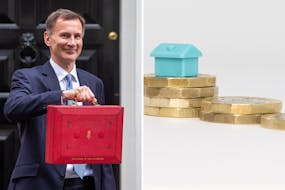Payments worth £4k available for low-income families – to help with cost of living

Struggling families could be entitled to cash boosts to help with food costs, energy bills, higher costs of living and more
Low-income families could get up to £4k worth of extra financial help towards their household bills.
From cash boosts towards the ever-increasing energy bills and school uniform costs to extra payments to help with the rising cost of living, here's all the help due to families in the next few weeks and months – and what to do to claim.
- The 28 best meal deals for half term and beyond
- Exact date millions will be paid benefits early this month
- 115 easy World Book Day costume ideas
- Struggling families can get £450 towards the rising cost of living
- Almost 1 million people to receive DWP £299 cost of living payment
Household Support Fund – up to £450
The government's Household Support Fund – an £824m fund that's given out to local councils by the Department of Work and Pensions (DWP) – could help if you're struggling to pay your energy bills or afford the weekly shop.
There are also schemes available to families with school-aged children that will help pay for school uniform or the higher costs of food over school holidays.
Each council gets to decide how to spend the money allocated to them and who is eligible for the extra help with most local authorities giving payments to vulnerable families in their area.
However, the scheme is set to close in a matter of weeks – on 31 March – and households are being urged to apply for the cash boost before it's too late.
Schemes are running across the country and you're advised to contact your local council to see what's available where you live.
A recent example of money been given out by the scheme is in Calderdale, West Yorkshire. Low-income households in the area are being offered £450 to help with high costs of living.You can see more schemes across the country here.
Families with children who live in Calderdale could get a £50 payment from Calderdale council per child – if they receive Housing Benefits and/or Council Tax Reductions or free school meals.
Someone who has a disability and receives Council Tax Reduction and/or Housing Benefit could also receive a £50 payment.
Switching bonus – £200
Households can get up to £200 simply for switching banks – and it's quick and easy to do.
The latest two banks to offer the cashback to anyone who changes bank accounts are NatWest – which is currently offering £200 for new and existing customers – and Lloyds – which will give you £175 to switch.
And, while it might sound like a hassle to switch, it's actually very simple and only takes 10 minutes thanks to the Current Account Switch Service (CASS). The CASS does all the hard work for you – including transferring all your regular payments and even redirecting your salary.
To get the cash bonus at Natwest, you'll need to sign up for a NatWest Reward account either online or in your local branch.
You then use the CASS to switch accounts from a previous bank.
Pay in £1,250 or more and use the app within 60 days and you'll receive your £200 after seven days. This account comes with an overdraft with an interest rate of 39.49% EAR variable
To switch to Lloyds, you'll have to sign up to a Club Lloyds account online or in branch and switch from a different bank using the CASS.
To qualify you must close your old bank account and transfer two or more direct debits. This should be done by Thursday 28 March.
The £175 is paid out within 10 working days of the switch starting.
For this account, you should also know:
- You must pay in a minimum of £2,000 per month to your new account or you'll have to pay a £3 per month fee
- It comes with an overdraft with a 27.5% EAR variable (0% up to £50)
Energy bill help – up to £2k
Major UK suppliers including British Gas can offer cash grants of up to £2,000 to help struggling families who've got into debt with their energy bills.
British Gas offers help to its own customers through the British Gas Energy Support Fund.
However, The British Gas Energy Trust also offers help through its Individual and Families Fund, a grant for households struggling with energy debt. This scheme is for any household, irrespective of whether they are British Gas customers, who find themselves in energy debt – either on their account or on their prepayment meter.
The scheme will likely close at the end of March 2024, unless funds are used up sooner.
You'll only be able to apply for this help if you meet the eligibility criteria – which includes being in energy debt and facing fuel poverty.
You'll also need to have contacted your own energy supplier to see if they can help you first, as well as Citizens Advice or another free money advice service.
Help towards rent – up to £965
Households who are struggling to pay their rent could get a Discretionary Housing payment (DHP) from their local council.
This money could help towards housing costs and is available for people claiming Housing Benefit or the housing element of Universal Credit.
You could get a DHP to cover housing if you've fallen behind on rent, orfor any rent deposits and any advance payments you need to make if you need to move home.
It's up to each individual council to decide who gets the payments, how much will be given and for how long, but the average DHP given to households is around £965, according to recent figures.
You'll need to apply through your local council.
Fuel vouchers – £50
Households who cannot afford to top up their prepayment meters could get a £50 fuel voucher to enable them to add credit to their gas or electric meter.
This help comes from the Fuel Bank Foundation, which provides emergency fuel vouchers to households with a prepayment meter that are at risk of or have already run out of credit.
You can use the vouchers at any shop signed up with PayPoint or Payzone.
Cold Weather Payment – £25 a week
The government's Cold Weather Payments are given out in cases of extreme temperatures (where the weather falls to 0C or below over seven consecutive days) and many households are able to get the help multiple times if they've had many weeks of bad weather.
Running from 1 November until 31 March this year, eligible households will be given the £25 payment for every seven days of very cold weather between 1 November 2023 and 31 March 2024.
You may get Cold Weather Payments if you’re getting:
- Pension Credit
- Income Support
- income-based Jobseeker’s Allowance (JSA)
- income-related Employment and Support Allowance (ESA)
- Universal Credit
- Support for Mortgage Interest
Winter Heating Payment – £55.05
Those on low income benefits – such as Universal Credit – could get extra help towards heating bills in the form of the Winter Heating Payment.
This is a payment given to households in Scotland on certain benefits and this year's payment is worth £55.05.
This payment replaces the Cold Weather Payment in the country and has the same eligibility requirements. Unlike the Cold Weather Payment, the Winter Heating Payment does not depend on how cold the temperature gets.
The Scottish government says:
'Winter Heating Payment helps people on low income benefits who might have extra heating needs. It's automatically paid once a year.'
Warm Home Discount – £150
Another scheme to help low-income families, the Warm Home Discount is given to households in England and Wales who claim certain benefits and have high energy costs.
The £150 one-off cash boost is given as a discount off your energy bill, or as a prepayment voucher. To get it, you'll need to check your supplier is signed up to the scheme first.
If they are, and you are eligible, then it'll either be paid to your energy supplier directly, or if you're on a prepayment meter you'll be given a voucher.
Households where you or your partner received the Guarantee Credit portion of Pension Credit are eligible for the payment – this is known as 'core group one'. Those who claim certain means-tested benefits and have high energy costs are also eligible and known as 'core group two'.
The qualifying means-tested benefits are:
- Housing Benefit
- income-related Employment and Support Allowance (ESA)
- income-based Jobseeker’s Allowance (JSA)
- Income Support
- the ‘Savings Credit’ part of Pension Credit
- Universal Credit
You could also qualify if your household income falls below a certain threshold and you get either:
- Child Tax Credit
- Working Tax Credit
The payment will be made automatically if you qualify.
Winter fuel payment – up to £600
Households including someone of retirement age could get £300 extra this winter through the government's Winter Fuel Payment – and it could be topped up to £600 for those on lower incomes.
You can get a Winter Fuel Payment if you were born before 25 September 1957. Depending on your circumstances, you'll get between £250 and £600.
This could include an extra 'Pensioner Cost of Living Payment' that's worth between £150 and £300. Eligible households will be due the cash in winter 2023 to 2024, which means some have already got it.
If eligible, you'll have received a letter in October or November telling you how much you'll get and when you'll get it.
Related stories
Martin Lewis shares tip that could bag you £200 free cash – deals are back!
Struggling families can get £450 towards the rising cost of living








